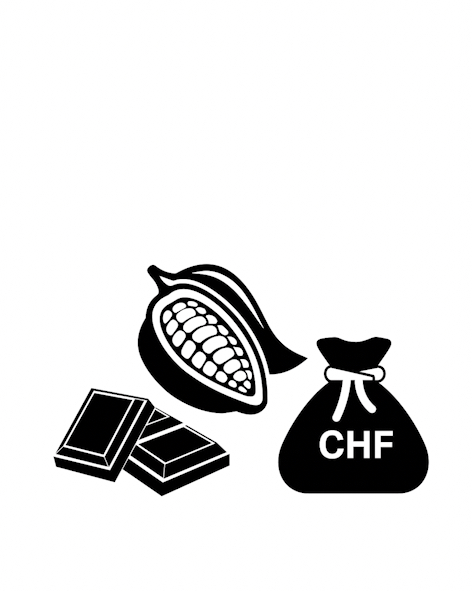
The chocolate of the future will have less cocoa or none at all

The high price of cocoa beans along with consumer concerns and government regulations surrounding deforestation and child labour have sparked a hunt for new chocolate ingredients.
The Swiss chocolate industry is under a lot of pressure. Cocoa prices have reached record highs, recently surpassing $10,000 (CHF9,150) per tonne for the first time. Poor weather and disease in Ivory Coast and Ghana have led to a deficit in cocoa beans for the third year in a row. The two West African countries account for about 60% of global cocoa production.
“Compared to the average prices recorded a year ago ($2,752 per tonne in London and $3,040 per tonne in New York), the average prices seen in April 2024 represented significant increases of 301% and 244% respectively,” said the International Cocoa Organization (ICCO) in its market review for April.
To add more pressure, the European Union has introduced a “zero deforestation” supply chain regulation which will come into force in January 2025. Seven agricultural commodities, including cocoa and cocoa products such as chocolate, cannot be sold in the EU unless it can be proven that they have not caused deforestation since 2020. Germany alone accounted for 21.7% of Swiss chocolate exports in 2023 with around 40% of all Swiss chocolate exports ending up in the shopping baskets of EU citizens.
“Time is of the essence: without a solution by the end of the year, access to the EU market will become massively more difficult,” said Chocosuisse in a press release in February. The Association of Swiss Chocolate Manufacturers was responding to the Swiss government’s decision to not introduce similar regulations in Switzerland but instead assess the regulatory impact on Swiss companies after the summer break.
Cocoa cultivation also presents other problems such as child labour and presence of heavy metals such as cadmium.
New alternatives
It is this challenging environment that is fuelling the search for new ingredients that can replace or minimise the use of cocoa in chocolate but are cultivated in Europe. UK based company NukokoExternal link is one such start-up that is making the most of this trend. It managed to raise $1.5 million in seed funding this year to scale up its cocoa-free chocolate made from fava beans.
“Nukoko are investing in this area as there is a critical need for alternatives now and into the future, as we have seen by the current cocoa price increases, caused by a supply deficit generated from climate change. The market needs alternatives that are derived from different areas that are not affected by climate change, thus giving a cheaper and more sustainable long-term option,” Ross Newton, founder and co-CEO of Nukoko, told SWI swissinfo.ch by email.
Nukoko sources the beans from the UK, which harvests 740,000 tonnes annually. Like cocoa beans, fava beans also contain a protein called vicilin that gives a chocolate-like flavour when broken down by fermentation and roasting.

More
Subscribe to our weekly top stories
German company ChoVivaExternal link is another European start-up that is using fermentation and roasting to produce high-quality chocolate. Instead of beans, the raw materials used are oats and sunflower seeds.
“We have studied the history and production of chocolate in depth and discovered that the typical taste does not come from the cocoa bean alone. Rather, up to 80% of the flavours are formed during production processes such as fermentation and roasting,” says the company’s website.
Another raw material with potential to replace cocoa is carob, a legume grown in southern Europe. Italian startup ForeverlandExternal link has created a range of chocolate with carob as the main ingredient. The company claims that its Freecao product uses 90% less water and produces 80% less CO2 emissions than conventional chocolate.
Virtuous chocolate?
The next frontline in innovation is using chocolate as a proactive means to benefit society and the environment. Researchers from the federal technology institute ETH Zurich have developed a cocoa gelExternal link made from the cocoa fruit that replaces the added sugar in chocolate. This would allow cocoa farmers to use most of the cocoa fruit, which only leaves the shell that can be used for composting or as fuel. Consumers will also benefit as chocolate made from this cocoa gel has 20% more fibre and 30% less saturated fat than conventional dark chocolate.

More
How the humble cocoa bean gets turned into chocolate and money
The Wyss Institute for Biologically Inspired EngineeringExternal link at Harvard University, which is funded by Swiss billionaire Hansjörg Wyss, goes even further. Researchers there have come up with a technology that converts greenhouse gases such as CO2 into a fat that mimics cocoa butter using just microbes and electricity. The gas fermentation technology, commercialised by spinoff company Circe Bioscience, has raised more than $8 million from investors to develop the world’s first chocolate made with fermentation-derived cocoa butter.
However, these technologies are still in their infancy and the chocolate of the future is not going to be radically different to what consumers are used to.
“I like to think for the consumer the future of chocolate in general terms will be the same, as in the same brands they love offering them the same delicious products that they have always enjoyed at an agreeable price point,” says Newton. “What may change is that the chocolate that is in or around these products will be made up in part or in whole from different sources, such as fava beans in our case.”
Edited by Marc Leutenegger/ts

More
How are you? What is on your mind? Take part in our big survey

In compliance with the JTI standards
More: SWI swissinfo.ch certified by the Journalism Trust Initiative































You can find an overview of ongoing debates with our journalists here . Please join us!
If you want to start a conversation about a topic raised in this article or want to report factual errors, email us at english@swissinfo.ch.